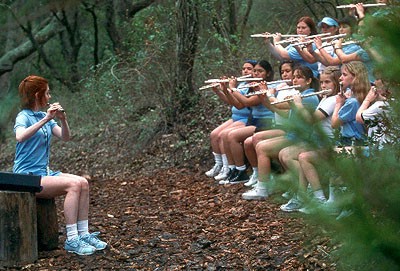Very Dry Fine Arts Summer Camp

Make sure you also read yesterday’s camp counselor story, Jeffrey Blum’s Wet Hot American Soccer Camp.
The summer I was a camp counselor, I managed to ruin everything on the first night.
Our supervisor was explaining that we would each get one full day off (24 hours) and one full night off (5 p.m. to 7 a.m. the next morning) per week. I quickly did the math on the number of counselors and the number of days in a week, and raised my hand to say “but that means that we’ll only have two counselors for 100 campers after 5 p.m. every day.”
He didn’t get it. So I took some of the markers we had been using to make welcome signs for the campers and drew him a chart.
“New rule,” he said. “You will get one full night off, but your day off now ends at 5 p.m.”
Our supervisor had never been a camp supervisor before, and I had never been a camp counselor before (and, in fact, our camp had never been a camp before) but we had all been to camp, so that meant we were qualified, right? I was a rising college junior, and very eager to take on adult workplace responsibilities such as “explaining why your policies are ineffective.” I had yet to learn that the true definition of being an adult in the workplace — at least at the entry-level — was keeping your mouth shut.
If a policy was in fact ineffective, there would be natural consequences, as we found out with our “no camper can ever be unsupervised, even to use the restroom” rule. Our campers were high school students — and before you ask, none of us counselors sat around chatting about which campers we found the most attractive — and you could see their resistance at the idea that they had to be accompanied to the toilet, but they were also, for the most part, quiet about it. They were orchestra kids, which meant they were used to following complex and arcane directions.
Except one night at dinner, one young man asked to use the restroom and the counselor who was supervising his table said no, because he could not supervise the dining hall table and the restroom simultaneously. None of the rest of us could help, of course, because we all had our own tables to supervise.
So the young man dumped a cup of water on his pants and said “Look, I had an accident. Will you let us go to the bathroom by ourselves now?” and our camp had its second, immediate, policy change.
I believe I got paid $1,000 for the summer, although the records for that are long gone. As it goes with camp, what I learned was far more important than what I earned, and I learned how to take leadership from a supervisor I secretly thought was incompetent (which may have been true, and may also have been colored by my being a rising college junior), and how to be friendly and supportive to my group of campers without actually becoming their friends.
I also learned that my workplace suggestions were both unwelcome and likely to backfire — which is a very important lesson for a rising college junior to learn.
In addition to the day off debacle, I also decided to explain how we could use our camp budget to make sure each counselor got a private bedroom. This makes a bit more sense if you understand that we were running this fine arts camp at my alma mater, and using college facilities, including one of the dorms. Because the camp was paying the college for the facility use, each dorm room cost the camp money, and there wasn’t enough money for each counselor to get a private bedroom. There was, however, enough money for each counselor but two to get a private bedroom, and I was in the pair asked to double up.
So I made a proposal to use some of our discretionary fund to rent another dorm room, and I quickly understood that this was an extremely inappropriate thing to have done. I was also told that I was “acting entitled,” and that felt unfair; why is it entitlement to ask for the same thing that everyone else has?
But summer camp isn’t fair. The workplace isn’t fair. And learning that, over the summer — along with the thousand bucks — was something I could carry away from the campfire and towards the future.
Support The Billfold
The Billfold continues to exist thanks to support from our readers. Help us continue to do our work by making a monthly pledge on Patreon or a one-time-only contribution through PayPal.
Comments